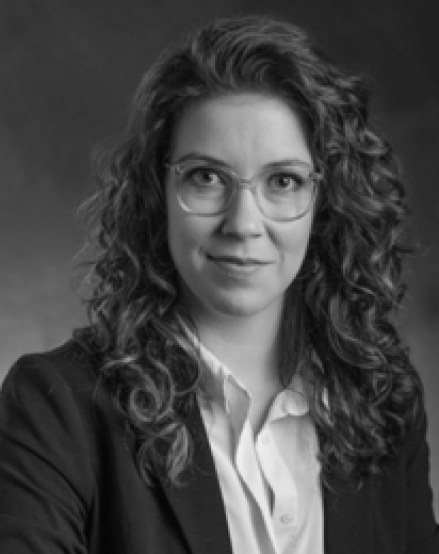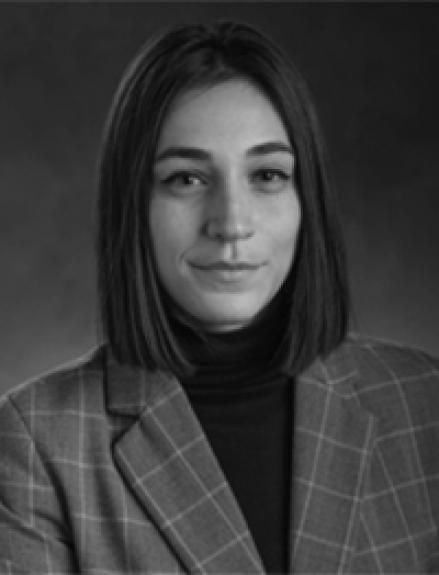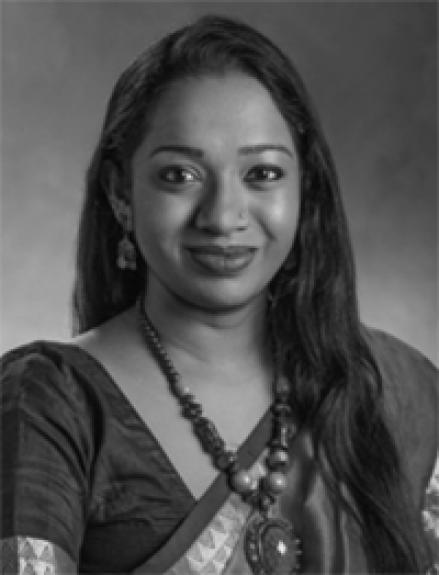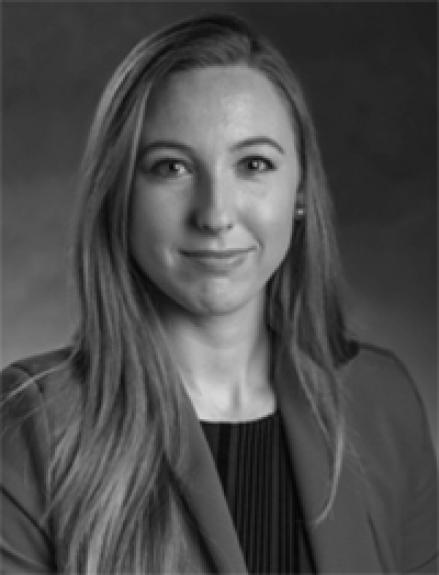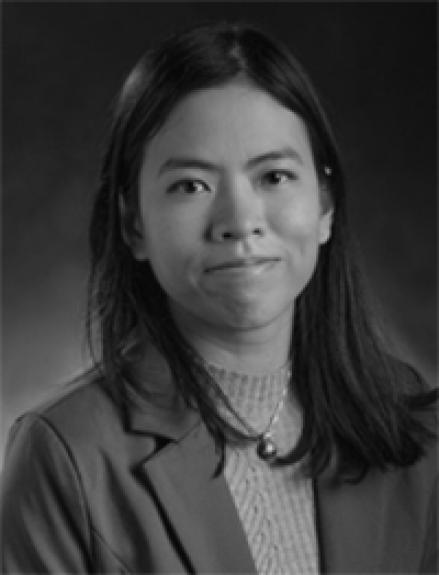Clare Grall
College of Communication Arts and Sciences
At the heart of Clare Grall’s approach to teaching is a passion for partnering with her students to determine how they can bring course content out of her classroom and into their daily lives and careers. She gives trust and respect top priority in building an intellectually challenging learning environment that thrives through warmth and inclusion.
Given that her research focuses on how to engage audiences when the messages matter most, it comes as no surprise that the most commonly used word to describe her teaching is “engaging.” Over the last four years, many students in her department cite Grall’s teaching and mentorship as a dominant influence in their decision to pursue graduate education.
Part of Grall’s ability to engage her students in course content arises from her use of innovative classroom techniques. When re-envisioning a former lecture-only class in partnership with a senior faculty member into a format featuring short lectures, small group discussions and brief question-and-answer sessions during each class hour, the traditional theater-style classroom setting prevented student movement, interfering with their vision.
In response, Grall reorganized the presentation style, so that the class’s four teachers moved around the classroom, naturally dividing it into small groups for discussions and Q&A sessions, essentially saving the new teaching format.
As a scholar, Grall actively forges an interdisciplinary line of research at the intersection of communication and neuroscience. Her work champions the use of neuroimaging to study media messages, particularly the social and emotional effects of narratives. Her research has been published in "Journal of Communication and Journal of Media Psychology," and her neuroimaging work has won consecutive top paper awards from the International Communication Association since 2017.
For her commitment to her students through excellent teaching and personal engagement and her exemplary scholarship in communication and neuroscience, Clare Grall is a most deserving candidate for the Michigan State University Excellence-In-Teaching Citation.
Zachary Lloyd
Music Theory, College of Music
Zachary Lloyd is exactly the kind of teacher that all undergraduates hope to have in their music theory courses: student-centered, dynamic and engaging, clear and endlessly supportive, both in and outside the classroom.
In a subject that is difficult, even drudgery, for many students, Lloyd empowers students to succeed by putting them at ease and problem solving with them. By explaining musical ideas in multiple ways, including through musical sound itself, Lloyd brings complex musical structures to life.
Lloyd centers his students — and their comfort— during each of his classes by fostering a positive learning environment; classes are busy but unhurried, productive yet relaxed.
Students work individually, in pairs and actively at the board on tasks that allow Lloyd to ask them guiding questions and lead them in the right direction, as needed.
In this atmosphere, students participate willingly, comfortably and happily in the learning process. As one student stated, “Mr. Lloyd made the class a place of comfort, without judgment. The atmosphere so welcomed discussion and questions that I always felt safe expressing when I didn’t understand something.”
Lloyd’s teaching is equally impressive outside the classroom. During the 2018 to 2019 academic year, he served as a tutor in the Music Theory Learning Center, a drop-in clinic for undergraduates to get help in understanding difficult music theory concepts. He has a knack for putting students at ease and quickly developed a regular set of clients at the center because of his positive impact on student understanding.
Lloyd’s research interests span rhythm and meter, Broadway musicals, music perception and cognition and, of course, music theory pedagogy. Although a master’s student, Lloyd has research accomplishments more typical of Ph.D. students in the discipline. He presents actively at conferences, won a best-paper award at an international conference, and has a forthcoming article in "Journal of Music Theory Pedagogy."
For his skill and dedication as a teacher and his promise and accomplishment as a scholar, Zachary Lloyd is a most deserving candidate for the Michigan State University Excellence-in-Teaching Citation.
Alyssa Lopez
Department of History
College of Social Science
Alyssa Lopez is an excellent teacher and promising history scholar, who synthesizes new and old techniques for effective online teaching. Because student participation is a vital part of history pedagogy, replicating student-instructor and student-student interaction in online courses is critical for online classroom success.
In a virtual class that she designed and taught, Lopez used Padlet, a virtual bulletin board that works much like its material counterpart, to enable student collaboration and discussion. Padlet can be used to display information, including images, links and videos, and can be updated with new information.
She also used it to evaluate student performance, not only students' successful integration of film analysis into weekly essays but also their engagement with course materials provided by her and generated by other students. The class proved to be a model for effective online teaching.
An up-and-coming scholar of African American and U.S. history, Lopez’s dissertation, “Screens, Seats and Picket Signs: New York City’s Black Film Culture, 1896-1945,” focuses on African American cinema: those who made it, those who watched it and the movie theaters in Harlem that showed it, primarily between the two world wars.
At its core, it is a multifaceted cultural history. Lopez uses cinema culture to get at representations of race, gender and class; urban sites of leisure and protest; and the numerous African American filmmakers, cultural critics, entrepreneurs and moviegoers involved. Innovative and original, Lopez’s dissertation will push existing scholarship in African American History, film studies and U.S. social history forward.
Lopez has presented her research at the Association for the Study of African American Life and History and the National Council of Black Studies. She has published several book reviews, co-authored a short essay in the "Black Power Encyclopedia" and serves on the editorial board of "Science Today Bulletin." In recognition of her excellence as an educator and scholar, she received a prestigious King-Chavez-Parks Future Faculty Fellowship for 2019-2020.
For her excellent teaching and ground- breaking research, Alyssa Lopez is fully worthy of a Michigan State University Excellence-in-Teaching Citation.
Reshma Menon
Department of Mathematics College of Natural Science
Reshma Menon is an outstanding teacher, who has made significant contributions to department curriculum development, an excellent researcher attacking some problems at the forefront of partial differential equations and how they relate to some free boundary problems and integro-differential operators, and an advocate for the advancement of women and minorities in mathematics.
Menon has excelled at teaching a variety of courses, including the calculus sequence, courses for pre-service teachers and courses for upper-division math majors. She is regularly among the department’s most highly rated instructors. As one of her students recalled, “By no means did I sign up for Math 317H with the intention of falling in love with formal mathematics. Thanks to Ms. Menon, however, that’s exactly what happened.”
In the classroom, Menon fosters a safe learning environment by reassuring students that learning is messy, errors are important and positive, and early failures should be expected. She constantly asks different kinds of questions to gauge her students’ understanding and draws on student input to launch discussions.
Because of her teaching excellence, Menon was invited to participate as a key contributor to a major redesign of the college algebra class, which involved the development of a new curriculum approach and an innovative assessment structure.
Menon is an exceptional researcher, who studies degenerate elliptic partial differential equations, with a focus on Dirichlet to Neumann maps and their representation as integro-differential operators, to understand properties of viscosity solutions — work that is important for modeling problems in physics.
Menon’s academic success has earned her three graduate scholarships: the Herbert T. Graham Scholarship, 2015 and 2019, and the Paul and Wilma Dressel Endowed Scholarship, 2018.
Menon is a leader in advancing diversity and inclusion. She is a founding member of the Association for Women in Mathematics, MSU Chapter, which focuses on inviting women mathematicians to campus to deliver talks and hosting social events to foster academic space for women mathematicians at MSU.
An exceptional teacher and inspiring researcher, Reshma Menon is a most deserving candidate for the Michigan State University Excellence-in-Teaching Citation.
Tara Reyelts
Department of History, College of Social Science
Descriptors such as passionate, dedicated, creative and rigorous appear in assessments of both Tara Reyelts’s teaching and research, contributing to the sense that, for her, teaching and scholarship are inextricably linked.
As a teacher, Reyelts seeks to show students how — but not what — to think by teaching them how to analyze diverse types of evidence and to construct a convincing argument based on their analysis.
She also teaches them how to think historically, particularly the importance of context and the need to approach the past aware of and sensitive to the different values, beliefs and mores of any given time and place.
While the former skill set relates to critical thinking, the latter is an exercise in empathy. Regardless, both are critical to a liberal arts education and an open, tolerant society and, as Reyelts shows, to creating an inclusive classroom in which diverse opinions incite great discussions, not ridicule.
Reyelts is a promising scholar of African, gender and legal history. Her dissertation "(Re)gendering Law and Justice from Precolonial to Postcolonial Ogidi, Igboland, 1857-1967," promises to be an important intervention in African, legal and gender history.
In addition to archival research, Reyelts conducted more than 140 oral interviews with men and women in the town of Ogidi, in Southeastern Nigeria, the region also known as Igboland. Using these rich and diverse sources, she traced the gender and gendering of law and justice in precolonial and colonial Igboland. This tracing shows how the absence of present-day Igbo women in positions of power is a legacy of British colonialism, not, as many have assumed, an unchanged patriarchy, native to the Igbo people and land.
To conduct this research, Reyelts received a Fulbright-IIE Award and an International Dissertation Research Fellowship from the Social Science Research Council.
Reyelts is a passionate and engaged teacher whose high expectations for her students are only exceeded by those she holds for herself. Enthusiastic and engaged, she exemplifies the sort of teacher-scholar that Michigan State University seeks to nurture and promote. As a representative of education at its best, Tara Reyelts is highly deserving of a Michigan State University Excellence-in-Teaching Citation.
Nguyen Truong
Department of Physiology
College of Natural Science
Nguyen Truong is a gifted and committed teacher, who wants her students to learn and to retain class material. Through her involvement, she performs the seemingly impossible, turning a big classroom into a small one, such that each student feels valued and believes their understanding of course material matters.
Likewise, she makes big concepts small, using mnemonics and thought exercises to help students understand important principles.
Through her efforts, she breaks down seemingly daunting and unwieldy concepts into understandable components — and then rebuilds the concepts to ensure full understanding of the whole.
As one of her students stated, “Ms. Truong actually cared about our learning and wanted us to succeed.”
To attain student understanding in her recitation sessions, Truong employs several creative teaching devices, such as encouraging students to teach her the material. As students work through their explanations, they find themselves understanding the designated subject more fully.
Because many of her students hope to pursue careers in health care, she also uses diseases and clinical therapies to emphasize underlying physiological concepts that she knows interest them.
One of her students observed, “It was refreshing how organized and well-prepared Ms. Truong was for her recitation sessions. She utilized a very methodical, guided-learning approach to teaching through class discussion, fill-in-the blank activities and images of pathways that we were encouraged to explain aloud to one another. By orchestrating an environment in which individuals had to think through the mechanisms presented during the week’s lectures, she created a setting where students came to collaborate with their peers and use knowledge gained from lectures to make connections on a deeper level.”
Truong’s dissertation research explores pancreatic ß cell failure in diabetes. She has presented her research at the Michigan Diabetes Research Symposium and the Michigan Physiology Society Meeting. She has published her research in such journals as "Obesity and Vascular Pharmacology."
For giving students the time and tools to develop their understanding of physiology concepts deeply and fully and for exceptional research work, Nguyen Truong is a most worthy candidate for the Michigan State University Excellence-in-Teaching Citation.
